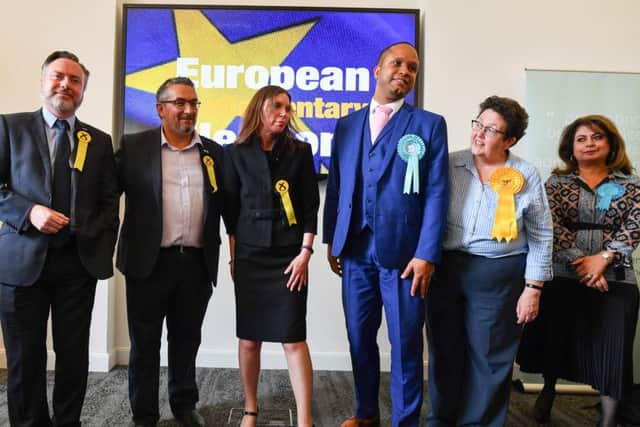Richard Leonard: It was a bad result for Labour but it’s not a green light for SNP
It was particularly hard to lose David Martin, who I count as an old friend.
Philosophical as ever David reflected that he came in on a tide in 1984, and he has gone out on a tide in 2019. His invaluable experience of European and trade affairs should not be lost from Scottish public life.
Advertisement
Hide AdAdvertisement
Hide AdI have said openly, in the week since the result, that as Scottish Labour leader I take responsibility for the defeat. When other parties put forward simple arguments on remain or leave, our position was, I accept, much more nuanced and difficult to promote to voters on the doorstep. That’s why I immediately reviewed our stance on Brexit and confirmed that we will support a confirmatory vote on whatever deal is brought forward with the option of remain also on the ballot paper. I will also campaign hard for a remain result ahead of any public vote.


But looking at the overall result, I believe that any suggestion the election counts last Sunday heralded a Brexit Party ‘victory’ should be viewed with some scepticism for two reasons. Firstly, Farage’s party inherited virtually all of his former party’s votes, adding additional votes predominantly from the Conservatives. So, it was not the insurgent grassroots explosion of populism that the right would have us believe. Secondly, the total votes for parties standing on a pro-remain platform outweighed the votes of Farage’s party, underlining that there is no majority for a no-deal Brexit.
Nonetheless, the fact that Farage once again has wind in his sails is a bad state of affairs for our politics. He will no doubt hope that the European election results will add pressure on the Conservative party not only to elect a leader who strongly supports a hard Brexit, which would almost certainly drag the country ever closer to a position of a no deal Brexit.
Add into this the pronouncements of Donald Trump, ahead of his state visit and his intervention designed to bolster the case for Boris Johnson as Prime Minister and to endorse the nationalist politics of his old friend Nigel Farage.
As these forces of reactionary politics coalesce for one more push to drag the UK economy out of the European Union on the hardest possible terms, it is absolutely clear that there needs to be a credible and better alternative.
For me that means strongly making the case for a democratised Europe and an economic approach for the continent based on investment, public ownership and a green future. Remain and reform.
Again, turning to the result last week, it would also be wrong of the SNP to attribute their increased vote share as a green light that a further independence referendum is acceded to by voters, let alone demanded by voters.
It is not.
But that has been precisely the response of the SNP government, who again used precious parliamentary time and resources last week to promote their obsession. They are without question out of step with the majority of people in Scotland.
Advertisement
Hide AdAdvertisement
Hide AdNot only is their proposal one that leads to uncertainty when people want security, but their prospectus for leaving the UK is based on a ‘growth’ commission that would instigate ten years of economic austerity. Add to that a currency policy of abandoning the pound within five years that would cause enormous upheaval across the country, and an economic shock not witnessed for generations.
The best solution for Scotland is retain the benefits of membership of the UK economic and political union but to increase – and crucially utilise - our devolution within it.
Finally, turning to my own thoughts on last week’s result. As is often the case in politics, when things don’t go your way, there’s an immediate desire to apportion blame and a call for heads to roll. Views on the state of our party have come in thick and fast from impartial observers, the media, party members as well as former and current politicians.
The fact is this, our share of votes in the Scottish Parliament has decreased at every election since devolution. This is not something I say easily, but we need to face up to it and understand why. It is my firm belief that people still agree with Labour values, but they have turned away from the Labour Party.
That must be our priority. To show our members, the people who vote for us, and the people who want a strong Labour Party in Scotland that these core values are still intrinsic to all that we do. That it is only the Labour Party which will fight for investment in our schools, hospitals and communities when others are committed to ongoing austerity. And that it is only the Labour Party which will secure a £10 living wage for all workers so that everyone has a decent standard of living. And it is only the Labour Party which will work with unions and businesses to plan our economy for the future we need.
The issues around the constitution look set to continue to dominate both Scottish and British politics. And we must address this in the here and now. But we must also look to the long term with a distinctively Scottish Labour vision based on investment and not austerity, an expansion of public ownership in place of private monopolies and an end to profiteering from our public services, and a redistribution of wealth and power in society. This is a future for Scotland well worth fighting for.